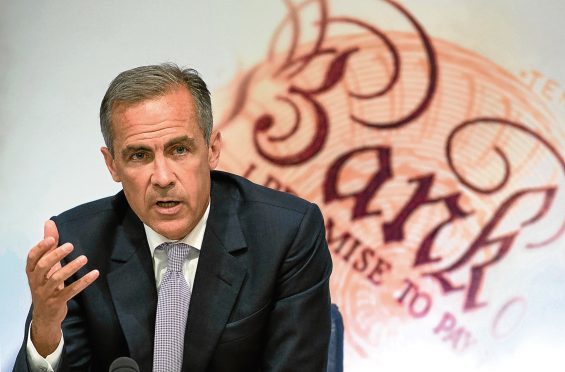Bank of England Governor Mark Carney has launched a scathing attack on cryptocurrencies such as Bitcoin.
He called for regulation to hold the virtual currencies to the “same standards as the rest of the financial system”.
In a speech to the inaugural Scottish Economics Conference (SEC) in Edinburgh yesterday, Mr Carney branded cryptocurrencies a “failure” and a lottery, and said they exhibited the “classic hallmarks of bubbles” that attract “fools”.
Mr Carney said: “The prices of many cryptocurrencies have exhibited the classic hallmarks of bubbles, including new paradigm justifications, broadening retail enthusiasm and extrapolative price expectations reliant in part on finding the greater fool.
“At present, crypto-assets raise a host of issues around consumer and investor protection, market integrity, money laundering, terrorism financing, tax evasion and the circumvention of capital controls and international sanctions.”
Bitcoin’s value continues to gyrate wildly, having rocketed to nearly £14,500 late last year before plunging and settling at around £7,900 yesterday.
A host of regulators, including in South Korea, China, Russia and India, have already expressed concern about Bitcoin, while Germany’s Bundesbank has also called for global regulation.
Mr Carney, speaking from London by videolink after his plans to travel to Edinburgh were thwarted by the wintry weather, said: “A better path would be to regulate elements of the crypto-asset ecosystem to combat illicit activities, promote market integrity, and protect the safety and soundness of the financial system.
“The time has come to hold the crypto-asset ecosystem to the same standards as the rest of the financial system.
“Being part of the financial system brings enormous privileges, but with them great responsibilities.”
The Bank’s financial policy committee is carrying out a study into the risks posed to UK financial stability by cryptocurrencies.
However, the governor insisted that, in his view, crypto-assets did not “appear to pose material risks to financial stability”.
He also conceded that the distributed ledger technology which underpins cryptocurrencies can help payments evolve.
“Even if the current generation is not the answer, it is throwing down the gauntlet to the existing payment systems,” he said.
Mr Carney added: “These must now evolve to meet the demands of fully reliable, real-time, distributed transactions.
“The Bank believes that distributed ledger technology could over time significantly improve the accuracy, efficiency and security of processes across payments, clearing and settlement.”
SEC was billed as “a united effort by some of the UK’s leading universities to highlight the role of economics in a rapidly changing world”.
It brought together students, academics and businesspeople from around the world.
The event was hosted by Edinburgh University, with the universities of Aberdeen, Glasgow, St Andrews, Dundee and Heriot-Watt also represented.
Topics included Scotland’s post-Brexit future, artificial intelligence in the job market and financial services technology, or fintech, with the discussions followed by a gala dinner.
